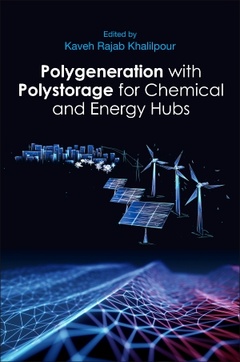Description
Polygeneration with Polystorage
For Chemical and Energy Hubs
Coordinator: Khalilpour Kaveh Rajab
Language: English
Subjects for Polygeneration with Polystorage:
Keywords
<; P>; Energy; engineering; grid integration; microgrid; power systems; generation; technologies; renewables; supply chain; demand side; micro scale; networks; exergy<; /P>
583 p. · 15x22.8 cm · Paperback
Description
/li>Contents
/li>Readership
/li>Biography
/li>Comment
/li>
Polygeneration with Polystorage: For Energy and Chemicals addresses the problem of both traditional and dispersed generation with a broad, multidisciplinary perspective. As the first book to thoroughly focus on the topic of polygeneration, users will find the problem presented from different scientific and technical domains down to both macro and micro levels. Detailed analyses and state-of-the-art developments in specific fields are included, focusing on storage in conventional energy supply chains and demand-side renewable polygeneration systems, management advice and the necessary market mechanisms needed to support them. This reference is useful for academics and professionals in conventional and unconventional energy systems.
1. Moving foreward to the past: Adaptation and flexibility 2. The nexus era: Towards a decentralized, integrated, connected, and prosumer future 3. Energy hubs and polygeneration systems: A social network analysis 4. Single and polystorage technologies for renewable-based hybrid energy systems 5. Integrated electricity and natural gas supply chains: The roles of power-to-gas and gas-to-power 6. Renewable energies: beyond security purpose, towards revenue with export 7. Poly-feed and Poly-product integrated gasification systems 8. CO2 conversion and utilization pathways 9. Solar thermal energy and conversion to solar fuels 10. Polygeneration systems in iron and steelmaking 11. Renewable hybridization of Oil and Gas supply chains 12. Biorefinery polyutilization systems: Production of green transportation fuels from biomass 13. Energy-Water nexus: Renewable-integrated hybridized desalination systems 14. Renewable energy integration in combined cooling, heating and power (CCHP) processes 15. Energy hubs design and operation management: A DS4S (screening, selection, sizing, and scheduling) framework 16. The transition to 100% renewable future: perspective and prospective
Academics and industries in the field of conventional and unconventional energy systems. Energy generators, network operators, policy makers, and regulators. Also various academic fields such as Engineering (Electrical, Chemical, Mechanical, etc).
Dr Khalilpour’s early research started with oil and gas, and over time expanded to carbon management, followed by renewable energies, and energy storage. His current key interest is the critical role of diverse energy generation (polygeneration) and storage (polystorage) systems in the context of integration with networks including electricity, gas, water, food, transport, society, environment, and economy.
More particularly, he works on improving social fairness and justice through optimised physical networks. In his previous book titled “community energy networks with storage he has introduced frameworks for fair and cooperative operation of community-based energy hubs. The current book focuses on complex energy networks consisting of multiple feed, multiple generation, multiple storage, and multiple products with the aim of improving manufacturing flexibility while reducing environmental impacts.
- Includes an outlined framework towards polygeneration and polystorage down to both micro and macro levels
- Contains fluid and continuous chapters that provide detailed analysis and a review of the state-of-the-art developments in specific fields
- Addresses the wider global view of research advancement and potential in the role of polygeneration and polystorage in the move toward sustainability
These books may interest you

Energy Storage 225.05 €



